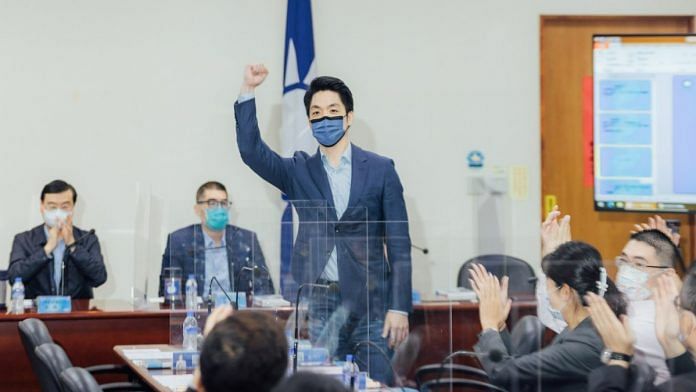New Delhi: Wayne Chiang Wan-an, the great grandson of former Taiwan president Chiang Kai-shek, will be contesting the Taipei mayoral elections scheduled to be held on 26 November, according to media reports.
The 43-year-old currently serves as a legislator in Taiwan’s parliament and belongs to the island’s largest opposition party — the Kuomintang.
The Kuomintang was the dominant political party in China until the communists came to power. In 1949, Kuomintang leader and then president Chiang Kai-shek went into exile in Taiwan after losing a civil war to the communists led by Mao Zedong. In essence, the Republic of China government, led by the Kuomintang, relocated to Taiwan, and Chiang Kai-shek resumed his presidency there in 1950. He died in April 1975.
In Taiwan, Chiang Kai-shek is seen as a divisive figure. For some, he is an anti-communist hero, and for most others, a ruthless dictator who imposed martial law for nearly three decades and left behind a legacy of authoritarianism.
Meanwhile, the Kuomintang party firmly stands in opposition to any form of Taiwan independence. Hence, whether Wayne Chiang Wan-an’s family history will prove to be an asset or a burden to his mayoral campaign, is yet to be seen.
The Democratic Progressive Party, to which Taiwanese President Tsai Ing-wen belongs, is yet to name its nominee for the post of Taipei’s mayor. However, reports indicate that Health Minister Chen Shih-chung will be tapped once the Covid-19 situation on the island is brought under control.
Wayne Chiang Wan-an will also be up against incumbent deputy Taipei mayor Huang Shan-shan in the upcoming polls.
Also Read: ‘It’s a commitment we made’: Biden says US military will defend Taiwan from China attack
A complicated family history
Wayne Chiang Wan-an was born in 1978 in Taiwan. He later studied law at the University of Pennsylvania in the US prior to embarking on a political career back in Taiwan.
In 2016, he won a seat in Taiwan’s parliament, known as the Legislative Yuan. According to a report in the South China Morning Post, he has maintained a “clean, hard-working public image”.
The 43-year-old politician is the son of John Chiang. John is the son of Chiang Ching-kuo, former Taiwanese president and son of Chiang Kai-shek.
According to reports, John Chiang and his twin brother Winston were born out of wedlock to Chiang Ching-kuo and his mistress in 1941, though this has not been verified.
In a journal published by the University of Pennsylvania in 2006, researcher Andy Greenberg wrote about how Wayne Chiang Wan-an was a teenager when his father allegedly told him the truth about their family’s past.
“…16-year-old Chang was called into his father’s room and told the secret of his lineage…As the child of President Chiang’s illegitimate son, John Chang, Wayne’s family background had remained a ‘public secret’, known to virtually everyone except Wayne himself,” wrote Greenberg.
For the longest time, John Chiang, who served as Taiwan’s foreign minister in the late 90s, had used his mother’s family name. But in 2006, he changed it to his father’s — a title that was kept out of reach for nearly 30 years.
Martial law in Taiwan in early years
After losing a civil war in mainland China, Kuomintang leader Chiang Kai-shek fled to Taiwan in 1949. There, he imposed martial law which would only be lifted after his death.
Martial law under the Kuomintang government was characterised by political suppression, corruption, extrajudicial killings, and imprisonment of political dissidents and more.
After Chiang Kai-shek’s death in 1975, enforcement of martial law was relaxed. This was done under the leadership of his son, Chiang Ching-kuo, who was serving as a principle advisor to the president at the time of his father’s death, and eventually became president in 1978. His son Chiang Ching-kuo became president a few years later.
In 1987, Chiang Ching-kuo lifted martial law, mainly in response to the growing dissident movement.
Why has Kuomintang lost political ground?
The main difference between the ruling Democratic Progressive Party and the Kuomintang is that the former does not endorse the 1992 Consensus.
The 1992 Consensus is an agreement reached between the Chinese Communist Party and the Kuomintang that then ruled Taiwan. While Beijing views the agreement as one that seeks reunification with the mainland someday, the Kuomintang views it to mean “one China with respective interpretations”. The Democratic Progressive Party, meanwhile, flat out disregards this agreement.
In 2016, China cut off official contact with the island after its newly elected President Tsai Ing-wen publicly announced that she would not endorse the idea of a single Chinese nation, specifically the 1992 Consensus.
It was a first, considering her predecessor Ma Ying-jeou was a member of the Kuomintang and had focussed on forging closer ties with Beijing.
This is one of the reasons Kuomintang has lost political ground to Democratic Progressive Party in the last decade. A poll in March this year found that over 52 per cent of Taiwan citizens support the island’s independence while 16 per cent support reunification with China.
Another reason could be the age factor. Only 3 per cent of Kuomintang party members are below the age of 40, making it the oldest political party in Asia, according to a report in The Diplomat.
However, politicians like Wayne Chiang Wan-an could help bridge this generational gap.
(Edited by Gitanjali Das)
Also Read: As Taiwan pushes back against China reunification call, a look at the 350-year-old dispute



